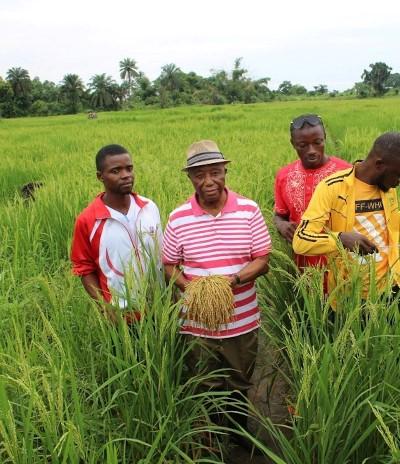Liberia: Boakai to Incentivize Agriculture, Create Access to Farming Technologies

As the agricultural sector of Liberia continues to undergo transformation, Liberia’s new President, Joseph Nyumah Boakai, says his administration will consider improving key areas of the sector to better the economy.
Delivering his inaugural address on Monday, January 22, in Monrovia, Boakai said his government will ensure incentives for agriculture and access to appropriate technologies for farmers, as well as improve market and trade, food storage, and processing, among others.
The agricultural sector of Liberia has transformed over the years. However, the sector still experienced low productivity as a result of limited investment and the reported mismanagement of resources intended to improve the sector.
Agriculture in Liberia is still being supported by funding from external sources.
Boakai, a former vice president and a former minister of agriculture, is now the country’s 26th president. He has declared agriculture a priority to improve food security and create more jobs for the youth.
He defeated former President George M. Weah at the close of the November 2023 runoff election.
The newly inducted leader of Liberia said in his speech that agriculture must remain the key driver of the Liberian economy for national growth and development.
“It is our long-held view that, more than any other sector, agriculture is the most critical catalyst to drive growth in an agro-based economy like ours, create employment, and ensure food security. It is our goal to leverage our comparative advantage in agriculture, including the provision of incentives and application of appropriate technology, as well as key interventions across the value chain such as food processing, storage, marketing, and trading,” he said.
Boakai’s vision, “ARREST” (Agriculture, Roads, Rule of Law, Education, Sanitation, Tourism), is defined as the development path he has set for the development of his country.
“We must and will harness opportunities in agriculture, roads, and other infrastructure development; improve the rule of law; rethink the education sector; improve sanitation; and unlock the potential of tourism,” he narrated.
Boakai believes that the economic linkages in these will create and reinforce each other in meeting the developmental goals that will help arrest and reverse years of economic downturn.
He mentioned that agriculture must be the key driver of the economy and potentially for national development, adding that it is a major source of employment in the country, provides over 50 percent of the population with a livelihood, and contributes substantially to the country’s GDP.
The new Liberian President said that he believes that his administration’s strategy for improving agriculture will help with food self-sufficiency, boost economic transformation, and reduce poverty.
According to him, the poor state of the country's roads has undermined development and reduced the quality of life of the citizens.
“This is indeed a major contributor to rural neglect in the country. This is why we view the building of good roads as a critical intervention in infrastructure improvement for economic growth and national development.
He said that his development agenda and the critical areas can’t be achieved without good and proper road networks.
“What we want to address for economic growth cannot be realized without the appropriate investment in road connectivity and other infrastructure developments,” the Liberian new leader added.
Boakai has reiterated plans to invest in roads to connect the people, improve agriculture, commerce, and industry, promote education, and promote tourism, as well as provide needed social services such as quality health care delivery for the people.
Meanwhile, the President of the ECOWAS Non-State Actors Coalition (ECONSA), H. Augustus Roberts, has welcomed the President’s vision for agriculture.
He said he is hopeful that the Boakai administration will do well for the agricultural sector.
“He understands the issues about agriculture, and he can bring about changes. His plans to improve agriculture to contribute to the economy are highly needed and necessary,” Roberts explained.
He said that the improvement of markets and trade are the main issues that governments on the African continent are seriously focusing on.
“For instance, the African Continental Free Trade Area (ACFTA) is something every country on the continent is now working toward. Therefore, the President is on the right track when he talks about priority for trade,” he mentioned.
Roberts said that there is also a need for the President to prioritize the Comprehensive Africa Agriculture Development Program (CAADP) Malabo framework to support agriculture.
Liberia is a signatory to the Malabo Declaration for Food and Nutrition Security, which requires 10 percent of public funding toward agriculture annually. But the country is yet to fully adhere to the framework.
There's a plan for the members of the Coalition of Non-states actors in Liberia to create awareness about the CAADP processes in the new government so that they can get an understanding of it to ensure its implementation.
In February, next month African presidents are expected for a meeting in Addis Ababa, Ethiopia, to get performance reports on the improvement of food security in their respective countries.
Over the years, Liberia’s performance in improving food and nutrition security has not been as expected.
